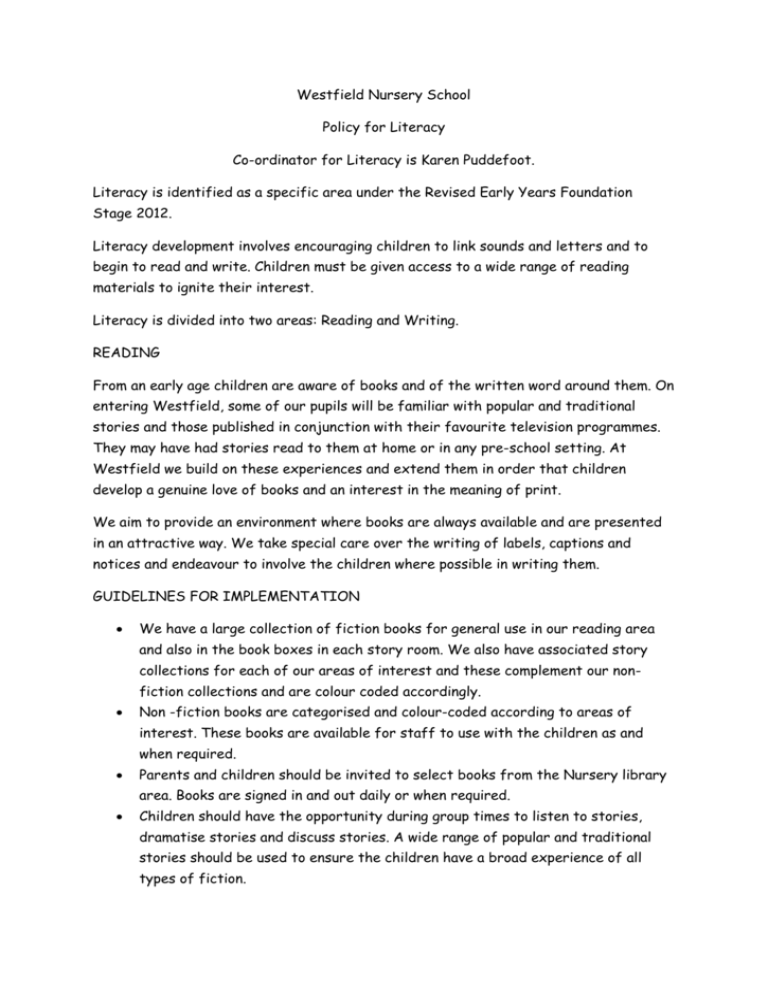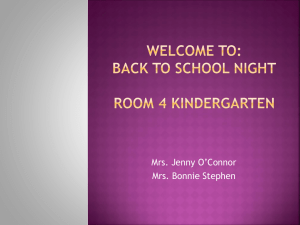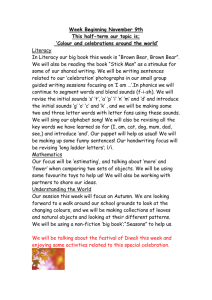Literacy Policy - WESTFIELD NURSERY SCHOOL DUNSTABLE
advertisement

Westfield Nursery School Policy for Literacy Co-ordinator for Literacy is Karen Puddefoot. Literacy is identified as a specific area under the Revised Early Years Foundation Stage 2012. Literacy development involves encouraging children to link sounds and letters and to begin to read and write. Children must be given access to a wide range of reading materials to ignite their interest. Literacy is divided into two areas: Reading and Writing. READING From an early age children are aware of books and of the written word around them. On entering Westfield, some of our pupils will be familiar with popular and traditional stories and those published in conjunction with their favourite television programmes. They may have had stories read to them at home or in any pre-school setting. At Westfield we build on these experiences and extend them in order that children develop a genuine love of books and an interest in the meaning of print. We aim to provide an environment where books are always available and are presented in an attractive way. We take special care over the writing of labels, captions and notices and endeavour to involve the children where possible in writing them. GUIDELINES FOR IMPLEMENTATION We have a large collection of fiction books for general use in our reading area and also in the book boxes in each story room. We also have associated story collections for each of our areas of interest and these complement our nonfiction collections and are colour coded accordingly. Non -fiction books are categorised and colour-coded according to areas of interest. These books are available for staff to use with the children as and when required. Parents and children should be invited to select books from the Nursery library area. Books are signed in and out daily or when required. Children should have the opportunity during group times to listen to stories, dramatise stories and discuss stories. A wide range of popular and traditional stories should be used to ensure the children have a broad experience of all types of fiction. Materials are always available for children to make their own books. Making individual or group books, may be a task undertaken during small group sessions. Literacy ‘stay and play’ sessions will be held on a rotational basis, with other curriculum areas. The workshops will seek to inform parents about how language and literacy is used throughout the Early Years Foundation Stage curriculum, using a range of cross-curricular activities. The workshops will also endeavour to provide helpful information and tips to enable parents to support and stimulate their children’s learning in this area. LINKING SOUNDS AND LETTERS At Westfield Nursery we aim to develop children’s phonological awareness through rhyme, alliteration and by gradually building an awareness of letter shapes and sounds. GUIDELINES FOR IMPLEMENTATION Games and activities to encourage careful listening and the ability to distinguish sounds will be used during small group time. Strategies and ideas from the ‘Primary National Strategy – Letters and Sounds (Phase One) will be used to introduce rhyming and alliteration. Single sounds/letter shapes will be introduced using materials from the ‘Jolly Phonics’ scheme. Generally a ‘Sound a week’ is introduced during message board with activities planned throughout the week to reinforce learning. This is further enhanced by sharing the ‘sound of the week’ with parents, along with activities for family home learning. Oxford Reading Tree books are lent to parents, who are encouraged to share them with their child, and swap them weekly. WRITING Children enter Westfield with widely differing writing skills. Whilst some will enjoy making marks on paper, a few will be beginning to form the letters of their name. Some will not yet be able to hold a pencil effectively, whilst others will have a developed grip and good control with writing implements. It is therefore vital, that we appreciate each child’s previous experiences in order that we develop their early writing accordingly. Children should be encouraged to write whenever possible, on drawings, art work and during imaginary play etc. GUIDELINES FOR IMPEMENTATION 1. Emergent writing will be actively encouraged throughout the inside and outside provision in order to enhance children’s learning. Role play areas should contain opportunities for context-based mark making, encouraging children to write for a variety of purposes, stories, lists, letters, cards etc. 2. Permanent mark-making areas are available in Butterfly classroom and outside under the verandah. These areas will be stocked with a variety of materials e.g. books, jotters, different sized and textured paper, envelopes, diaries, a variety of pens, pencils, chalks and markers. 3. Children should be encouraged to form letters in a variety of ways e.g. in sand, with dough, paint (in the garden when weather permits) chalk, sandpaper, magnetic letters etc. 4. Hand eye co-ordination can be developed through such activities as threading, completing puzzles, gluing, painting and using malleable materials. These provide a sound basis for early writing skills. 5. Children should be given opportunities to contribute to displays by writing their names, captions and labels. This can be done in a variety of ways e.g. emergent writing, adult scribing, copy writing or by using ICT. Examples of writing from different cultures should be displayed wherever possible. HANDWRITING It is imperative that any intervention in a child’s writing is sensitive to prevent the loss confidence, interest and enthusiasm. A range of strategies can be used to cater for the individualised nature of each child’s learning style, and can be taught across the curriculum e.g. with paint, sand, dough etc. GUIDELINES FOR IMPEMENTATION Positive encouragement and sensitive treatment needs to be employed in order to progress children from ‘drawing’ the letters to forming them correctly. Adults should describe how each letter should be formed e.g. ‘the letter ‘a’, around and up, back down and flick’ and encourage the child to do the same Encouraging early attempts at copywriting needs to be carried out with sensitivity. Whilst some children enjoy trying to copy adult’s scribed writing, others may be discouraged by not producing ‘perfect’ results. All attempts should be valued and celebrated. Mark-making and handwriting activities should be planned in accordance with the recommendations and developmental steps in the Early Years Foundation Stage guidance. These activities will be an integral part of our day-to-day planning and will be relevant to the children’s overall experience e.g. writing names in Christmas or Mother’s Day cards, making tickets for a role play bus etc. Examples of children’s mark-making and attempts at early writing will form part of their ‘Learning Journey folders’ MONITORING AND EVALUATION The key workers (Teacher/Nursery Nurse/Teaching Assistant) for each class group will monitor and evaluate the children’s learning in Literacy on a continual basis. This will involve informal observations of children’s activities as they play and also in a more formal way, as the children complete adult initiated activities during small group time. The co-ordinator for Literacy will evaluate relevant data and assessment and feed back results to all staff, alongside any relevant strategies or interventions. An action plan will be formulated and implemented to ensure the continued development of Literacy. Written November 2013 To be reviewed November 2014








